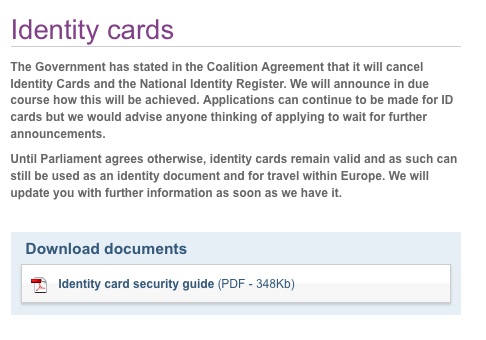
New, post UK-election, Home Office Identity and Passport Service website.
United States civil libertarians, wearily fending off ongoing assaults on such pillars of our society as the presumption of innocence, the requirement for a judicial warrant to invade people's privacy, and due legal process for suspects and defendants under both present and past administrations, have good excuses for not attending much to developments across the Atlantic.
But our United Kingdom brothers and sisters in English-speaking democracy have, if anything, seen much worse erosion of long standing freedoms under 13 years of Labour governments. They been hit with a law permitting police detentions without trial for up to 42 days, biometric National ID cards, universal DNA collection by state authorities, and ever stronger restrictions on non-violent free speech.
My go-to source on civil liberties in the UK is Henry Porter who writes at the Guardian. (Full disclosure, he interviewed my partner and I when we were litigating the early Bush regime "no fly list" experience.) Porter is close to gushing about the civil liberties reforms promised as part of the Conservative-Liberal Democrat coalition government formed this week.
Many of the specific items about which reform is promised would require long explanations (that I am not qualified to attempt) of the British legal system. But one aspect of the situation is something many of us over here might yearn for: when a UK government brings in a new policy, the change happens. No months of waiting for the Senate to shred what the voters expected. The hated UK National ID card is already on hold; the government web site (pictured above) was changed the same day the new government was formed."The parties agree to implement a full programme of measures to reverse the substantial erosion of civil liberties under the Labour government and roll back state intrusion." This sentence, published in the Conservative-Lib Dem coalition agreement, is one that civil libertarians have been waiting a long time for ...
One of the most frustrating parts of watching the attack on rights and liberties over the last 13 years has been the failure of anyone in government to admit what was happening. The programme seemed to unfold with a demonic and silent energy all of its own. But now in the agreement we have that acknowledgment, as well as an assurance that civil liberties will be at the heart of the new coalition government. ...As I read through the list, I have an exhilarated sense of restoration.
Even the most enthusiastic commentators know the devil is in the details. But here's Porter again:
Let's hope this works out better for them than the bright promise of November 4, 2008 has worked for us. Meanwhile, let's be glad someone is still pushing for freedoms.We must wait to see what is in the great repeal bill before passing judgment, but this is a promising start that touches on all the important areas and provides great hope for campaigners and activists, so long disdained by the Labour government as being either hysterical or crazed by individualism. We know enough to say that real and important changes have already taken place, and that these could only have occurred under the new coalition.
No comments:
Post a Comment